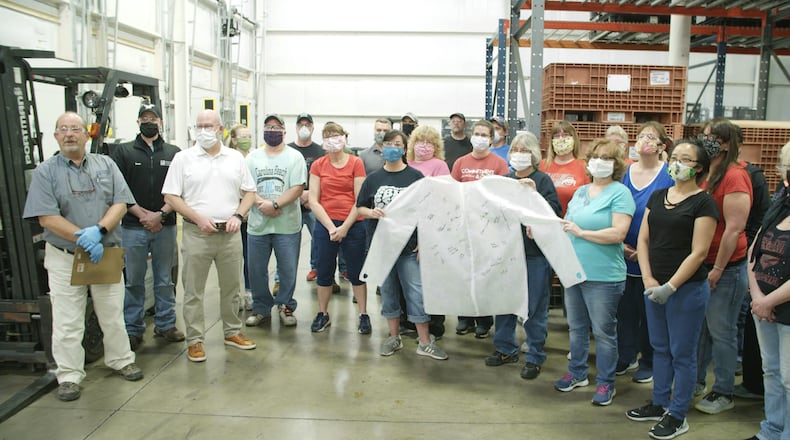The 13-minute documentary, which had its premiere at the 2021 Cleveland International Film Festival in April, will be screened beginning June 10 at the Neon Movies, 130 E. Fifth St., Dayton.
“Drawing on the city’s innovation and manufacturing roots, an unlikely team came together to make sure medical workers had the protection they needed to face the uncertainty ahead,” writes Hard Road Pictures, Cook’s production company.
After graduating from WSU, Cook moved to Washington, D.C., for about eight years before moving back to Dayton in 2019. During his time in D.C., Cook was part of numerous large filmmaking projects that promoted environmental conservation, primarily shooting documentaries for the Sierra Club.
Directing the film during the pandemic was a career homecoming of sorts for Cook, as the film was executively produced by his longtime mentors and friends, Julia Reichert and Steven Bognar (Academy Award winners for “American Factory”).
“They’ve been a huge support all these years, (including when) I’ve been gone, as well,” Cook said. “We’ve worked together off and on, so this was really fun to come back and kind of have a project with a Dayton crew.”
At the start of the pandemic, Bognar and Reichert were busy putting their heads together with other documentary filmmakers, including Cook, to figure out what could be done in the moment. In April 2020, Cook said the group caught wind of the PPE shortage problem happening at Miami Valley Hospital and they quickly got their cameras rolling.
Credit: Ian Cook
Credit: Ian Cook
“You have to jump in,” Cook said. “You don’t know where you’re gonna end up, (or) if you’re gonna end up anywhere.”
Thanks to Cook and the rest of the crew’s quick action, they were able to capture intimate triumphs and failures as FastLane, Ohio’s Manufacturing Extension Partnership located within the University of Dayton Research Institute, scrambled to reinvent isolation gowns, the PPE supply that was disappearing the fastest.
In March, Premiere Health’s PPE supply was getting down to just a seven-day supply, and shipments were beginning to be diverted to “hot spot” cities also experiencing a shortage.
The documentary follows UDRI’s test runs, using Tyvek HomeWrap as a material to design gowns. However, the water-impermeable material made too much noise for medical professionals to wear around patients.
Meanwhile, nearly all of Industry Product Co.’s 300 employees in Piqua had been laid off due to the pandemic. UDRI discovered the manufacturer had an automotive material that could be used to make gowns, and huge machines that weren’t being used because production was at a standstill.
IPC jumped on board with UDRI, bringing back the majority of its employees, to quickly figure out a solution despite the company’s lack of experience in the medical equipment industry.
“It was very much like an on-the-fly, let’s-figure-it-out kind of moment,” Cook said.
Growing up, Cook said he knew of the Wright brothers, but only had a basic understanding of Dayton’s innovation history. Upon moving back to Dayton in 2019, Cook rediscovered the Wright brothers’ history and “dove in” to relearning his hometown history.
“It was in my initial conversation with Steve about this story (that) got me so excited about it ... just that kind of, that collaboration between all these different experts in their own fields coming together and doing something totally different,” Cook said. “It was obviously terrifying to think about it running out of PPE and that story was very present in the news at that moment. So, we were excited about telling a positive story — or what would hopefully be a positive because we didn’t know if it would work out or not — but what would hopefully be a positive story in this otherwise very negative time.”
The employees working tirelessly at IPC to mass produce the makeshift gowns were as “Daytonian and Ohioan” as they come, Cook said.
“It was powerful,” Cook said. “You felt a lot of warmth from them and you know, they had taken a lot of risk to come back in. … That gave me goosebumps when I was there. You’re driving away at the end of the day realizing this building has three shifts — all day, 24 hours a day, they’re doing this service to get these gowns out for the front-line workers.”
For more about Cook’s documentary, and updates on how to see it, visit hardroadpictures.com. The film notably serves as the lead-in to screenings of “Holler,” the feature directorial debut of Wright State graduate Nicole Riegel. For information on screenings, visit neonmovies.com.
Credit: CONTRIBUTED
Credit: CONTRIBUTED
About the Author



